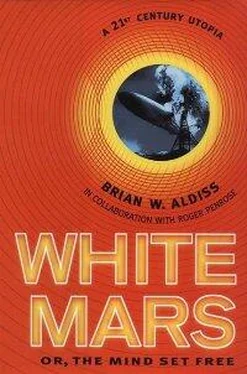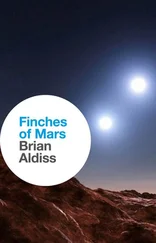Brian Aldiss - White Mars
Здесь есть возможность читать онлайн «Brian Aldiss - White Mars» весь текст электронной книги совершенно бесплатно (целиком полную версию без сокращений). В некоторых случаях можно слушать аудио, скачать через торрент в формате fb2 и присутствует краткое содержание. Год выпуска: 1999, ISBN: 1999, Издательство: Little, Brown UK, Жанр: Фантастика и фэнтези, на английском языке. Описание произведения, (предисловие) а так же отзывы посетителей доступны на портале библиотеки ЛибКат.
- Название:White Mars
- Автор:
- Издательство:Little, Brown UK
- Жанр:
- Год:1999
- ISBN:0-316-85243-0
- Рейтинг книги:5 / 5. Голосов: 1
-
Избранное:Добавить в избранное
- Отзывы:
-
Ваша оценка:
- 100
- 1
- 2
- 3
- 4
- 5
White Mars: краткое содержание, описание и аннотация
Предлагаем к чтению аннотацию, описание, краткое содержание или предисловие (зависит от того, что написал сам автор книги «White Mars»). Если вы не нашли необходимую информацию о книге — напишите в комментариях, мы постараемся отыскать её.
White Mars — читать онлайн бесплатно полную книгу (весь текст) целиком
Ниже представлен текст книги, разбитый по страницам. Система сохранения места последней прочитанной страницы, позволяет с удобством читать онлайн бесплатно книгу «White Mars», без необходимости каждый раз заново искать на чём Вы остановились. Поставьте закладку, и сможете в любой момент перейти на страницу, на которой закончили чтение.
Интервал:
Закладка:
In those days, I became too busy to think about myself. There was much to organise. Yet some things organised themselves. Among them, sport and music.
I was jo-joing back from the new hospital wing when I saw the freshly invented game of skyball being played in the sports arena. I stopped to watch. Aktau Badawi was with me.
Skyball was a team game played with two balls the size of footballs. One ball, painted blue, was half filled with helium so that, when kicked into the air, its descent was slow. Play could continue only when the blue ball was in the air. Grouping and positioning went on while it was descending. The blue ball could not be handled, unlike the other ball, which was brown.
“Thankfully, we are too old to play, Tom,” said Aktau.
A young man turned from the watching crowd and offered to explain the subtleties of the game to us.
We laughingly said we did not wish to know. We would never play.
“Nor would I,” the man said, “but I in fact invented the blue ball in honour of our lighter gravity. My name is Guenz Kanli, and I wish to speak to you about another innovation I have in mind.”
He fell in with us and we walked back to my office.
Guenz Kanli had a curious physiognomy. The flesh of his face seemed not to fit well over his skull, which came to a peak at the rear. This strange-looking man came from Kazakstan in Central Asia. He was a YEA who, at twenty years of age, had fallen in love with the desolation of the Martian landscape. His eyes were bloodshot, his cheeks so mottled with tiny veins they resembled an indecipherable map.
He lived at the top of one of our spicules, which gave him a good outlook on the Martian surface. He described it in eloquent terms.
“It’s all so variable. The wispy clouds take strange forms. You could watch them all day. There are fogs, and I have seen tiny snow falls—or maybe frost it was. The desert can be white or grey or almost black, or brown, or even bright orange in the sun.
Then there are many kinds of dust storm, from little dust devils to massive storms like avalanches.
“None of this can we touch. It’s like a form of music to me. You teach people to look inward on themselves, Tom Jefferies. Maybe looking outward is good too.
“We need more of a special music. It exists already, part sad, part joyful.
“If I may, I will take you to hear the wonderful Beza this evening.”
Guenz Kanli was enthusiastic to a remarkable degree, which was perhaps what commended him to me in the first place. I dreaded that a mood of irreversible depression would descend on us if the ships did not soon return.
That evening, we went to hear Beza play.
I was seized with Guenz’s idea, although I never entirely saw the connection, as he did, between Beza’s gipsy music and the Martian landscape.
There was always music playing somewhere in the domes—classical, jazz, popular, or something in between. But, from that evening on, one of our favourite musicians was Beza, an old Romanian gypsy. I persuaded the leading YEAs to listen—Kissorian, May Porter, Suung Saybin, and others. They were taken by it, and from then on Beza was in fashion.
Beza had been elected as DOP—rather against his wish, we gathered—by a remote community in the Transylvanian highlands.
To see Beza during the day, sitting miserable and round-shouldered at the Mars Bar or a cafe table, wearing his floppy off-white tunic, you would wonder what such a poor old fellow was doing on Mars. But when he took up his violin and began to play — bashavav, to play the fiddle—his real stature became apparent.
His dark eyes gleamed through his lank grey hair, his stance was that of a youngster, and the music he played—well, I can only say that it was magic, and so compelling that men ceased their conversation with women to listen. Guenz sometimes took up his fiddle too and played counterpoint.
With the fiddle at his chin and his bow dancing, Beza could play all night. His music was drawn from a deep well of the past, like wine flowing from centuries of slavery and wandering, rising from the pit of the brain, from the fibres of the body. These tunes were what is meant when music is said to be the first of all human arts.
A time dawned when Guenz’s theory that this was the true music of Mars became real to me. I wondered how it had come into being before Mars had ever been thought of as a place for habitation.
After I had listened to Beza I would lie in bed, wide awake, trying to recreate his music in my head. It always eluded me. A slow sad lassu, with its notes long drawn out, would be followed by a sprightly friss, light and airy as a stroll along an avenue, which then broke into the wild exhilaration of the czardas. Then, quite suddenly, sorrow again, driving into the heart.
I must admit I learned these foreign terms from Guenz, or from Beza himself. But Beza was a silent man. His fiddle spoke for him.
Beza’s music was so popular that it became subject to plagiarism. In a small classical quintet was an ambitious Nigerian, Dayo Obantuji. He played the violin adequately, and the quintet was a success, perhaps because Dayo was something of a show-off. He liked to leap to his feet to play solos and generally appear energetic.
The quintet became less popular while Beza’s music was still the rage.
Dayo was also a composer. He introduced a piece, a rather elegant sonata in B flat major, which he christened “The Musician”.
After “The Musician” had been played several times, Guenz became suspicious. He made a public denunciation of the fact that much of the sonata, transposed into another key and with altered tempo, was based on a piece that Beza played.
Dayo strongly denied the accusation.
When Beza was brought into an improvised court as a witness in this case of plagarism, he would only laugh and say, “Let the boy take this theme. It is not mine. It hangs in the air. Let him play with it—he can only make it worse.”
There the matter was dropped. But “The Musician” was not played again.
Instead Dayo came to me and complained that he was the victim of racism. Why had this unfair charge been brought, if not because he was black? I pointed out that although Beza was himself of a minority—indeed a minority of one—he was almost the most popular man in Mars City. I said I felt strongly that racism had no place on the planet. We were all Martians now. Dayo must be mistaken.
Angrily, Dayo asserted that I was denying what was obvious. He had been disgraced by the accusation. His name had not been properly cleared. He was the victim of injustice.
A long argument ensued. Finally Guenz was brought in. He also denied prejudice. He had found an echo of Beza’s music in Dayo’s piece. It was hardly surprising, but there it was. However, he had been convinced that the similarity was accidental, so powerful was Beza’s influence. He was content to believe that Dayo’s name had been cleared. And he apologised graciously, if rather playfully, for having made the charge in the first place.
Dayo again asserted he had been victimised. He burst into angry tears.
“Oh dear, the blue ball is in the air again,” said Guenz.
Then Dayo changed tack. He admitted that he had stolen the theme from Beza’s music, having been unable to get it out of his head.
“I admit it. I’m guilty as hell. You lot are guilty too. Okay, you show no racial prejudice against Beza and the Orientals, but you are prejudiced against us blacks. You secretly don’t believe we’re good for anything, though you’ll never admit it. I’m quite a good musician, but still I’m a black musician, not just a musician. Isn’t that the case?
“My compositions were not appreciated. Not until I took that Romanian tune and transcribed it. Didn’t Brahms do the same sort of thing? What’s wrong with it? I altered it, made it my own, didn’t I? But just because I was black, you picked on me.”
Читать дальшеИнтервал:
Закладка:
Похожие книги на «White Mars»
Представляем Вашему вниманию похожие книги на «White Mars» списком для выбора. Мы отобрали схожую по названию и смыслу литературу в надежде предоставить читателям больше вариантов отыскать новые, интересные, ещё непрочитанные произведения.
Обсуждение, отзывы о книге «White Mars» и просто собственные мнения читателей. Оставьте ваши комментарии, напишите, что Вы думаете о произведении, его смысле или главных героях. Укажите что конкретно понравилось, а что нет, и почему Вы так считаете.










